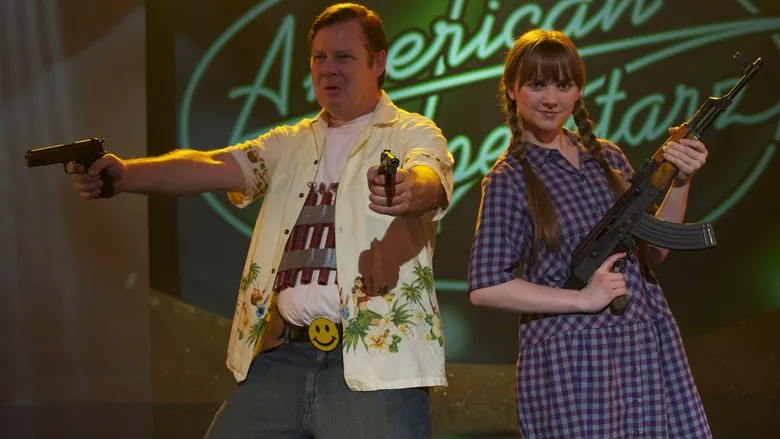God Bless America: A Sharply Satirical Journey into Cultural Discontent
Director Bobcat Goldthwait’s “God Bless America” plunges audiences into the psyche of Frank (Joel Murray), a man utterly disaffected and driven to the brink by the seemingly trivial yet soul-crushing facets of modern American society. Stripped of his job, diagnosed with a brain tumor, and alienated from his ex-wife, Frank’s frustration curdles into a nihilistic resolve. He retrieves his Colt from the closet, not for self-harm, but to enact his own warped sense of justice. His mission takes an unexpected turn when he encounters Roxy, a rebellious teenager who shares his disdain for pervasive idiocy and superficiality. Together, this unlikely duo embarks on a cross-country rampage, targeting self-absorbed reality TV stars and rudely inconsiderate moviegoers as their initial subjects for what they deem necessary social correction.

This darkly comedic, yet undeniably thought-provoking film, serves as a visceral commentary on the vacuity of contemporary pop culture and the erosion of common decency. Frank and Roxy become symbols of a boiling point, representing a collective frustration with the seemingly insurmountable waves of digital narcissism and public ignorance.

Unexpected Talents Behind and Before the Camera
It’s fascinating to note the professional backgrounds of the key figures in “God Bless America.” Bobcat Goldthwait, renowned for his chaotic portrayal of Zed in the “Police Academy” franchise, brings a surprisingly nuanced and incisive directorial voice to this film. His transition from madcap comedian to a filmmaker capable of constructing such a piercing social satire is truly remarkable. Likewise, Joel Murray, who embodies Frank with an almost heartbreaking blend of despair and conviction, is widely recognized for his more composed role as Fred Rumsen in “Mad Men.” These unexpected turns highlight the depth and versatility within the industry, proving that talent can flourish in diverse and challenging roles.

A Familiar Premise, A Stark New Lens
The narrative of a disillusioned individual resorting to violence against a society perceived as decaying under the weight of consumerism and moral bankruptcy is not entirely new. Precedents like “Falling Down,” with Michael Douglas’s D-Fens, or the chaotic frenzy of “Natural Born Killers,” have explored similar thematic territories. In a post-9/11 world, where on-screen violence can easily feel exploitative or simply tiresome, such narratives face the challenge of being provocative without veering into mere sensationalism.
“God Bless America,” however, skillfully manages to differentiate itself. Despite an opening scene that hints at the raw, almost gleeful brutality of grindhouse cinema (conjuring images of films like “Hobo with a Shotgun” or the stylized, naïve violence of “Kick-Ass”), the film quickly establishes itself as something more intricate. It initially treads a fine line between these influences, occasionally echoing the media-saturated rampage of “Natural Born Killers” but always with its own distinct satirical bite.

The true appeal and tension of “God Bless America” lie largely in the uncertainty of its direction. Will Frank and Roxy’s journey simply devolve into a predictable, gratuitous revenge fantasy, or will it evolve into something more profound and thought-provoking? The film masterfully weaves dark humor throughout its narrative, with unexpected jokes on sensitive subjects like pedophilia and lighthearted references to “Star Trek,” providing moments of unsettling levity. Crucially, the violence, while present and impactful, is less gratuitous and more purposeful than one might anticipate, serving the film’s satirical intent rather than merely providing shock value.
Unmasking Humanity Amidst the Havoc
“God Bless America” takes an remarkable and profoundly humanistic turn when Frank, in a surprisingly tender moment, teaches Roxy how to shoot using teddy bears as targets. This interaction is imbued with a quiet tenderness that unexpectedly fosters a deep sense of empathy for both characters. It’s a rare and commendable achievement for a film that operates as a biting social satire, daring to make its destructive protagonists relatable.
From this pivotal scene forward, the narrative’s intensity accelerates. The duo expands their scope, targeting those they deem morally reprehensible, from bigoted homophobes to manipulative televangelists. As their journey progresses, Frank and Roxy become increasingly convinced that their idealistic, yet deadly, victim list should encompass anyone contributing to the erosion of common sense and decency across the entire nation. Their targets shift from the individual to the systemic, reflecting a spiraling conviction that society itself is the disease.

A Bold and Uncompromising Climax
The film culminates in a truly unforgettable finale, where director Bobcat Goldthwait audacious breaks the fourth wall, discarding any pretense of cinematic conventions. Instead of delivering a neatly packaged, moderately humanistic conclusion often expected from such a film, Goldthwait instead addresses the audience directly. His message is delivered with an unwavering seriousness and conviction that elicits a profound sense of awe and respect. This direct confrontation elevates the film from a mere revenge fantasy to a bold, unapologetic declaration. It’s akin to witnessing a lucid kamikaze pilot, clear-eyed and resolute, making their final, impactful statement, leaving the audience to grapple with the disturbing truths laid bare. “God Bless America” is not just a film; it’s a stark, dark mirror held up to contemporary society, forcing viewers to confront their own complicity and frustrations.